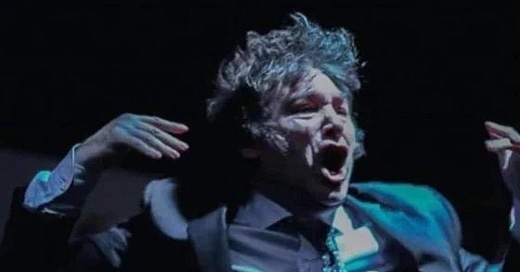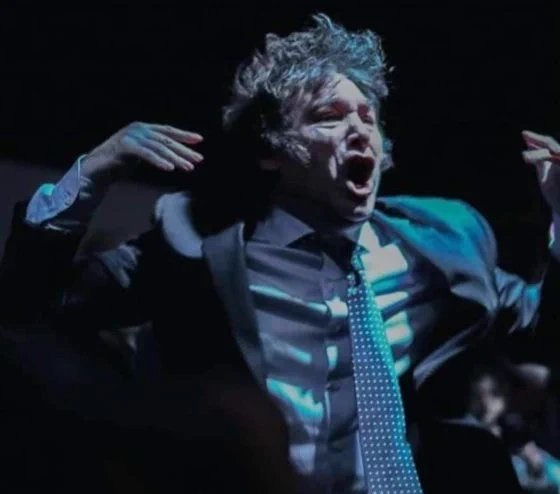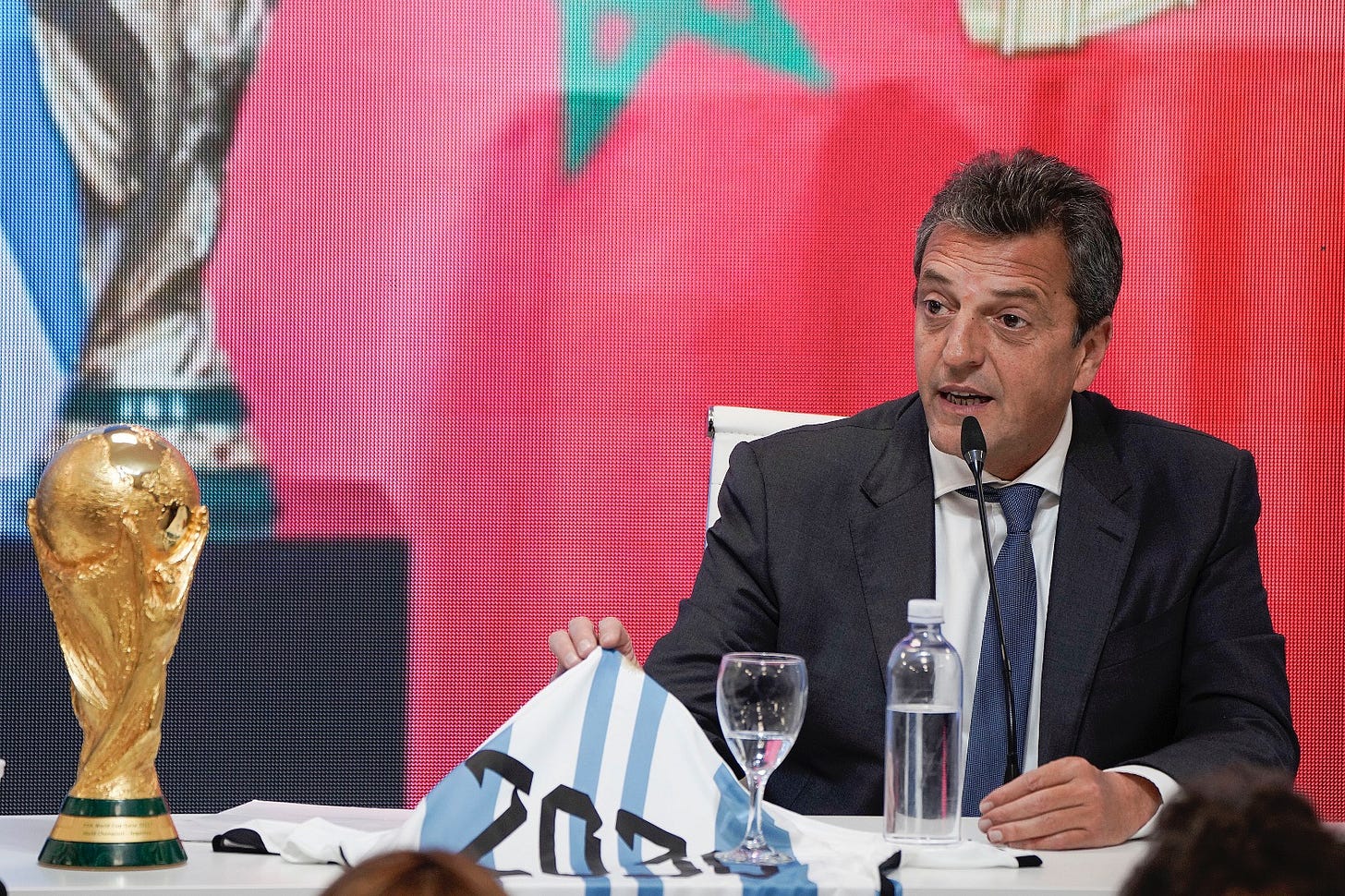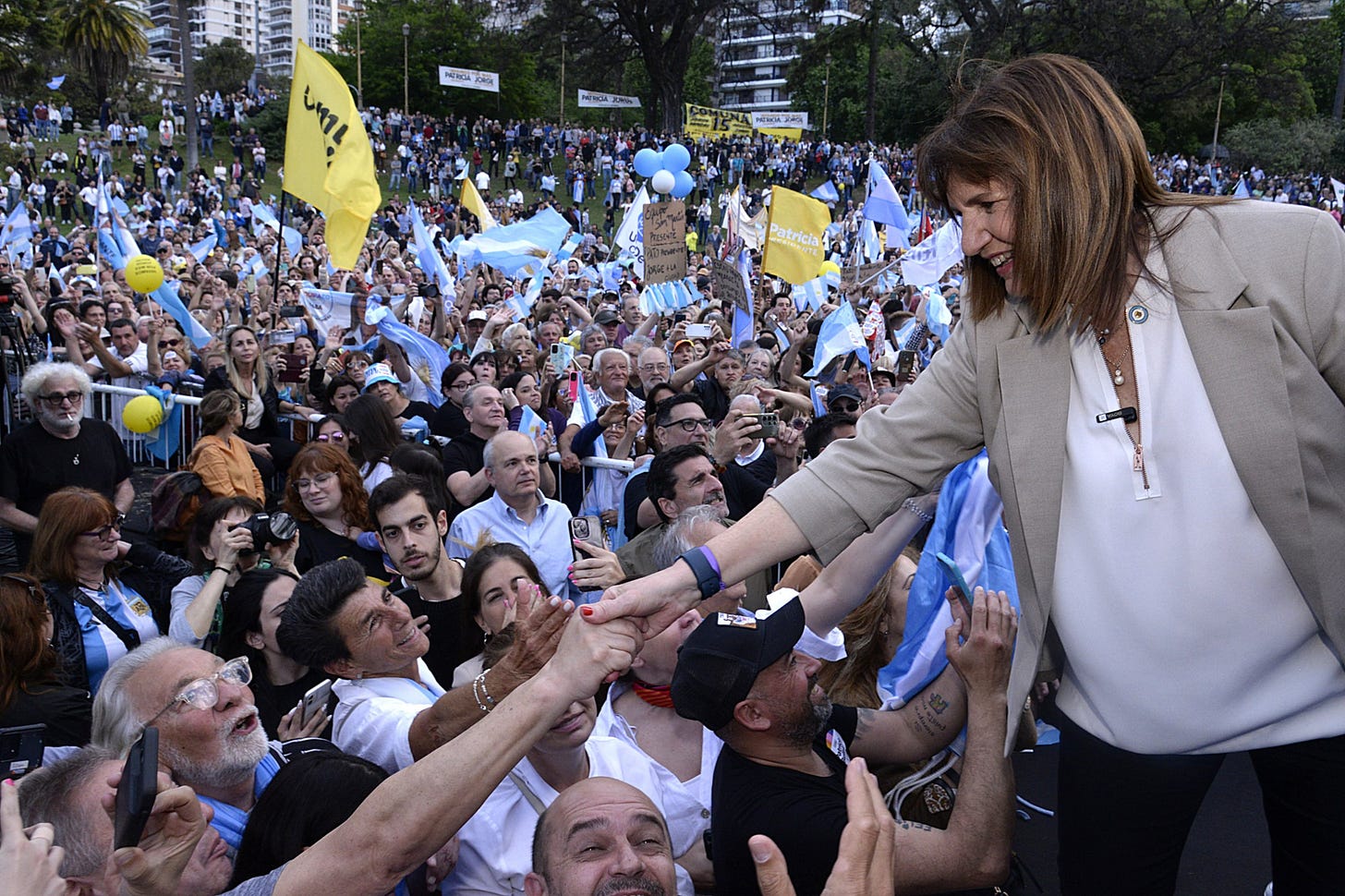Here’s what you need to know about Argentina’s 2023 elections
Libertarian Milei, Economy Minister Massa and security hawk Bullrich are facing off at the polls
We’re happy to welcome our founder Amy Booth back to PWS for a guest post on Argentinian elections!
Tomorrow, Argentines will head to polling stations in schools all over the country to have their say about who should be the next president. The vote is one of the most consequential in decades: frontrunner Javier Milei is an ultra-right-wing libertarian economist drawing comparisons with Trump and Bolsonaro.
Local rules known as the veda electoral (loosely translated as the electoral closure or ban) mean the press can’t publish polls or projections about the results until the numbers come in on Sunday evening. So for the moment, let’s look at who’s in the running.
I’m including the percentage each of them got in the August 13 primaries — these are a strong predictor of what could happen in the general elections because the general population is required to vote and they take place simultaneously, on the same day, turning them into a kind of giant poll.
To win outright on Sunday, they would need 45% of valid votes, or 40% plus a 10-point lead over the runner-up. Otherwise, the top two will go to a run-off on November 19.
Both the current Peronist government of Unión por la Patria and the mainstream conservative opposition, Juntos por el Cambio, have failed to solve dizzying inflation or deliver sustained economic growth over the past eight years. The vote comes in a year when an unrelenting drought devastated the harvest of key commodity crops such as soybeans, taking a chunk out of the Central Bank’s reserves. Inflation of 138% has pushed even working people into poverty. At present, around 40% of the population live below the breadline, including most children.
Javier Milei
Running-mate: Victoria Villarruel
Coalition: La Libertad Avanza
Primaries result: 29.9%
Milei is an extreme right-wing libertarian economist and outsider who shocked just about everyone by coming first in the August 13 primary elections. Running unopposed within his La Libertad Avanza coalition, he secured more votes than either of the other coalitions.
On the policy front, he wants to dollarize the economy, dynamite the Central Bank, close most government ministries, privatize education, health and transport, and make it easier for citizens to bear arms. These proposals have drawn widespread condemnation not just from the left, but from a large part of the economic establishment.
Perhaps as striking as his actual ideas is his persona: vituperatively aggressive, he is infamous for insulting journalists he perceives as hostile and, most recently, comparing the Argentine peso to “excrement”. He also cloned his dog when it died, believes he can still speak to the dog in the great kennel in the sky via a medium, and believes he’s on a mission from God.
His running-mate, Victoria Villarruel, is notorious for denying the crimes against humanity perpetrated by Argentina’s 1976-1983 civic-military dictatorship. Villarruel’s father and uncle were military officers involved in the dictatorship, and she has visited military officials convicted of crimes against humanity in jail.
Human rights groups estimate that 30,000 people were forcibly disappeared, tortured and killed by the dictatorship, many of them doped, loaded into planes, and thrown alive into the river plate. While this is an estimate, since the regime of absolute repression and terror made it impossible for many families to report their loved ones’ disappearances, documents from part way through the junta’s rule put the figure at at least 22,000, and the disappearances continued for years afterwards. Yet, Villarruel has disputed this figure, and Milei himself claimed in one of the presidential debates that the true figure is 8,753.
She has also argued that killings by guerrilla groups during the 1970s are comparable to the regime of systematic state terror orchestrated by the junta, and created the Civil Association of the Victims of Argentine Terrorism (CELTYV), an organization dedicated to demanding “justice” for those killed by guerrillas. This false equivalence is known as the “two-demons” theory, and is a staple of denialist discourse.
Sergio Massa (Current economy minister)
Running-mate: Agustín Rossi (Current chief of staff)
Coalition: Unión por la Patria
Primaries result: 27.3% (UxP overall), 21.4% (Massa individually)
It may seem paradoxical that an economy minister is running for the presidency when inflation is at 138% inter-annual and Argentina’s towering debt with the IMF feels more like a house of cards. But his growing role as a captain steering Argentina through the economic storm by negotiating the country’s funds on the international stage has consolidated his leadership role.
A lawyer and career politician with a smile full of shiny, white teeth, his supporters see him as the mature, establishment-friendly negotiator the country needs to steer Argentina through the fine balancing act it will need to lower inflation, advocate for the country in negotiations with the IMF, and just maybe guide Argentina back to prosperity.
Massa’s nomination as the UxP candidate dragged Argentina’s Overton window significantly to the right. The announcement prompted leftist social leader Juan Grabois — who had dropped out just hours previously — to leap back into the race, although he was never competitive and lost in the primaries. A former mayor of the town of Tigre, Massa has cozy ties to everyone from business leaders to football execs. His critics call him a panqueque (pancake) — meaning that he’s flip-flopped around politically to suit his interests.
A center-right figure in a coalition many supporters have followed for its progressive values, the question for Massa on Sunday is how many of Peronism’s more left-wing Kirchnerists he can keep on board — and how many centrist voters he can lure from the opposition.
Patricia Bullrich
Running-mate: Luis Petri
Coalition: Juntos por el Cambio
Primaries results: 28% (JxC overall), 17% (Bullrich individually)
Patricia Bullrich's life is worthy of a biopic. She was security minister to Mauricio Macri during his 2015-2019 presidency and leader of PRO, the party representing her coalition's hard-right hawk wing. But her politics have tracked steadily to the right over decades.
Born into a wealthy family in Buenos Aires, she became involved in politics at an early age, joining the Peronist youth movement, and has struggled to throw off accusations that she was involved in the Montoneros guerrilla group. She spent six months in jail for graffitiing the University of Buenos Aires in 1975, the year before the military coup, and spent years exiled in Brazil, Mexico and Spain during the dictatorship.
During the campaign, she's majored on security and order discourse, even promising to create a mega-prison named after ex-president Cristina Fernández de Kirchner. But her economic policies have been harder to pin down during the two recent televised presidential debates.
Juntos por el Cambio as a whole came second in the primaries, but she fought a tough internal battle for the coalition's nomination against Buenos Aires mayor Horacio Rodríguez Larreta, who campaigned as an intelligent, bridge-building moderate. Since then, analysts say she has found herself stuck in the middle ground and struggling to define what she stands for.
Also in the running are leftist human rights lawyer and feminist campaigner Myriam Bregman and anti-Kirchnerist Peronist Juan Schiaretti, but they're polling in single digits and not seen as competitive.
Will the next president be decided on Sunday?
Given the split in the primaries, it would take a major shift in the vote for anyone to win outright. With noise around Milei reaching a fever pitch, it's likely to be a question of who goes head-to-head with him in November.
As well as co-founding this newsletter, I’m the managing editor of the Buenos Aires Herald, an English-language news website about Argentina. We’ll be covering the elections all day on Sunday, so check out buenosairesherald.com if you’re interested. Don’t forget to read Pirate Wire Services next week: by then, the dust should have settled and we’ll know whether the country has a new president-elect or the roller-coaster ride will run into November.
The Big Headlines in LATAM
The United States agreed to ease sanctions on Venezuela after the government of Nicolas Maduro and opposition leaders agreed to have next year’s election monitored by international observers.
The decision eases restrictions on oil exports and trade, following a regional trend in South America as an increasing number of countries normalize relations with the Maduro government.
Venezuela goes to the polls Sunday for the first round of presidential primary elections. Right-wing María Corina Machado is widely expected to emerge as the winner among the opposition but is technically barred by the government from holding office. It is unclear if she would be allowed to hold office if she emerges as the victor in the second round.
Business heir Daniel Noboa on Sunday won Ecuador’s presidential election, becoming the youngest president ever to hold office in the country. From an ultra-wealthy political dynasty, he has vowed to rebuild the South American country, which is struggling with a weak economy and rising crime and violence.
He will govern for 17 months, finishing the term of former president Lasso, who dissolved the government amidst corruption investigations into his cabinet.
What we’re writing
Are criminal armed groups responsible for the drop in deforestation in Colombia? Evidence seems to suggest that in the last two years, it was gangsters more than park rangers who were protecting delicate rainforest ecosystems. This week Joshua wrote a feature on how ceasefire dynamics have changed the motives of criminal groups to become land defenders— but their motives are far from honorable. You can read more at Sierra magazine here: “Armed Groups as Forest Protectors in Colombia: A Risky Dynamic”.
Colombian president Gustavo Petro started a war of words with the Israeli Foreign Ministry this week over the ongoing siege of Gaza, even going so far as to compare the actions of the Israeli government to Nazi Germany. The Israeli ambassador responded by threatening to end arms and security exports, calling Petro’s comments “anti-Semitic” and “aggressive”. What’s behind Petro’s rhetorical war, which accuses Israel of wanting to commit a “genocide”? We put the comments into context in this week’s “Ship’s Log”, for paid subscribers.
Spanish Word of the Week
Cuchipanda- an impromptu food celebration!
Invite some buddies over, cook a feast, celebrate life and enjoy their company and conversation? Well, that’s a Cuchipanda, my friends!
One day we at PWS hope to host a Cuchipanda for all our contributors and readers. You are invited! So are all the capybaras in the world.
It’s going to be a blast.
Hasta pronto piratas!









Another informative post filling the void on South America. I have bookmarked the Buenos Aires Herald.